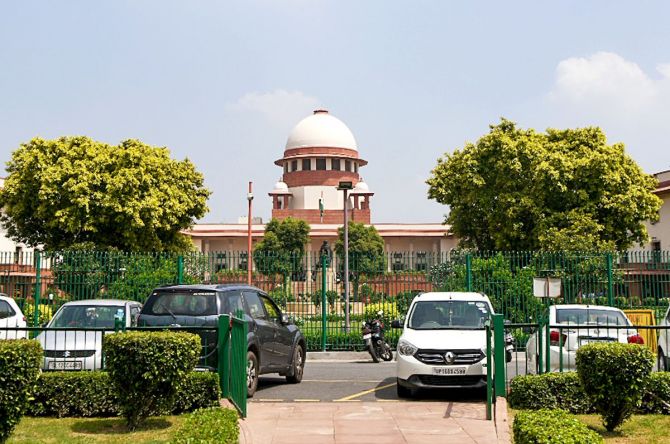In a big step towards unclogging the top judiciary burdened with humongous pendency of cases, the Supreme Court has, in one massive sweep, binned 13,147 old 'diarised but unregistered' cases, including one filed more than three decades ago.

An order issued by Registrar Judicial-1 Chirag Bhanu Singh on Thursday said all these cases were filed more than eight years ago but the defects pointed out by the Registry to the respective counsel or petitioners in-person were not 'cured'.
The cases got the diary numbers prior to the year 2014, and the list included a case filed way back in 1987.
These petitions just sat idly in the Registry, adding to the ever growing pendency.
As per the data uploaded on the Supreme Court website, there were as many as 70,310 pendig cases as on September 1, 2022.
These included 51,839 miscellaneous matters and 18,471 related to regular hearing.
The order by the Supreme Court registrar said the parties to the cases seemingly do not intend to prosecute the litigations any further as they did not cure the defects even after a lapse of several years.
'These bunch of 13,147 unregistered but diarised cases have been registered prior to the year 2014, to be precise before August 19, 2014.
'These cases had been filed more than 8 years ago. As per the practice then in vogue, the matters had been returned to the counsel/petitioner-in-person for rectifying the defects noticed in the matters respectively.
'They have never been rectified ever,' the order said.
'For all the reasons discussed hereinabove, I am constrained but to hold that there is no valid and a plausible reason to allow the aforesaid matters to be received for registration.
'I decline to register the aforesaid diary numbers,' it noted.
The court official said, in consonance with the earlier practice no papers were retained by the registry while notifying the defects.
The counsel would file a complete set of pleadings only after curing all the defects so notified.
It was only after August 19, 2014 a provision was made to retain one copy of the plaint and court fee stamps with the Registry.
Under the old rules, the parties concerned were to cure the defects within 28 days, which was extended up to 90 days.
'The parties have failed to take any effective steps for years at end to rectify and cure the defects so notified.
'The statutory period for curing the defects is well over. Seemingly the parties do not intend to prosecute the lis (litigation) any further. Umpteen numbers of years were allowed to the parties to cure the defects, but to no avail,' the registrar's order said.
The official said 'no steps worth the name' were taken by any of the parties concerned to even seek enlargement of time to cure the defects after the completion of 28 days.
'It is also not the case that the defects were merely formal in nature. The defects have remained unaltered till date and that too for no reasonable cause. It is not days, but years that have gone by. One of the oldest diary numbers relating back as far as the year 1987.
'No effective steps have ever been taken by anyone to even keep the lis (litigation) alive. The matters have died with the efflux of time itself. Nothing, literally survives now,' it said.
Out of the 70,310 cases pending in the apex court as on September 1, 2022, 17.28 per cent or 12, 092 cases are miscellaneous matters which are incomplete or not ready and where preliminaries have to be completed.
The data showed there are 493 matters before various Constitution benches.
Of these, 343 are pending before five-judge benches, 15 with seven-judge benches and 135 are matters that have to be heard by nine-judge Constitution benches.
Justice U U Lalit, who took over as the 49th Chief Justice of India on August 27, has laid particular emphasis on clearing the pending cases and under him the apex court has adopted a new system of listing cases.
Responding to his felicitation by the Supreme Court Bar Association on Thursday, Justice Lalit had said since August 29, when the new system was launched, till September 14, 5,200 cases were decided by the top court as against 1,135 fresh filings.











 © 2025
© 2025